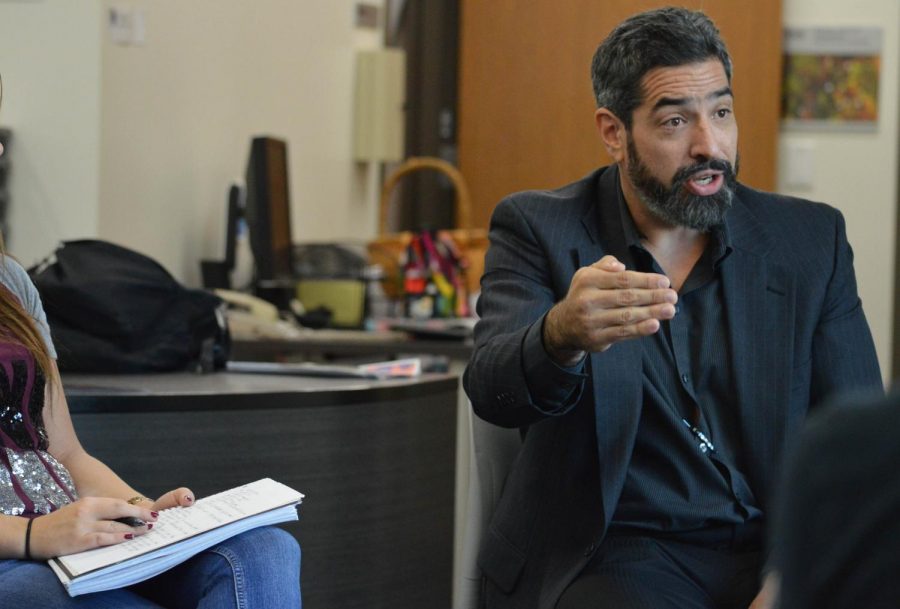A Field Guide to the Path of Red and Black Ink
Dr. Antonio De La Garza, Assistant Professor, Communication gives academic advice to prospective PHD students during a “Tukwut Talk” at the Cross-Cultural Center on Tuesday, November 14.
November 27, 2017
The experiences of undocumented immigrants and Dreamers propelled CSUSM’s Assistant Professor of Communications, Dr. Antonio De La Garza to pursue communication and ethnic study based disciplines in the academic field.
In a Tukwut Talk installment hosted by the Cross-Cultural Center in USU 3400 on Nov. 14, De La Garza shared his accounts regarding his past and present time within academia and activism.
At the age of 12, De La Garza made friends with undocumented children while collaborating with them on some farm work. Through his new friends, he eventually grew curious of how their family and livelihood operated under secrecy.
Dr. De La Garza said, “I wanted to know how you could have a totally different identity in public and a different one in private, and play this game of hide and seek with the U.S. government.” He later added, “I’ve just followed that curiosity my whole career.”
Dr. De La Garza said that within the rigors of graduate school and the accompanying weight that comes with it, students need to maintain an internal initiative that pushes them forward. “You need to have something that drives you, a question that keeps you going even when s— is hard,” he said.
A student in attendance asked as to what separated De Le Garza from his competition and he replied with three ways that professors perceive the merit of a student. De La Garza said students should focus on researching, teaching and performing services critical to their field, outside of the classroom but within the realm of academia. “So, it’s less about, what specifically you gotta do, and more about making sure that while you’re preparing for applications, you are doing work in all of those three areas that you can point to in your application,” said De La Garza.
He said students should make sure to create connections with people in their same positions. De La Garza described how finding acquaintances within graduate programs can foster a lot of logistical aid and academic help. He explained, “You need to have three to five people in graduate school who are in your corner and if you can’t identify those people then it is not a good fit for you. Look for other programs. The way this system works, the people ahead of you are the ones who decide that you’re right.”
De la Garza then explained that if people aren’t willing to waive certain luxuries in exchange for genuine fervor and pursuit of a discipline, graduate school isn’t for them. He stated that “As a grad student you’re gonna get summer and winter vacation, you’re not gonna spend that vacation with your family and friends. In fact you’re probably gonna lie to your family and friends about how busy you are, not because you don’t wanna spend time with them, but because you are just going to need some quiet time to decompress and then you’re gonna have to hit the research grind.”
Following up that piece of insight, De La Garza discussed how the connections he has made through his masters and PhD programs have become his, “revolutionary family” and that, “you will never make friends like the friends you make in graduate school, because you’re all working so hard together . . . it’s a beautiful thing.”


